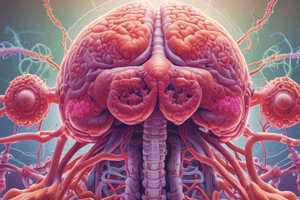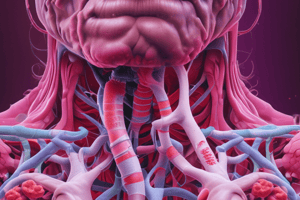Podcast
Questions and Answers
What is one of the main functions of coarse hairs in the nose?
What is one of the main functions of coarse hairs in the nose?
- To filter large particles from air (correct)
- To regulate temperature
- To enhance the sense of smell
- To secrete mucus
The upper respiratory system includes only the nose.
The upper respiratory system includes only the nose.
False (B)
Name two components of the upper respiratory system.
Name two components of the upper respiratory system.
Nose and pharynx
The respiratory system's ciliated mucous membranes _____ airborne particles.
The respiratory system's ciliated mucous membranes _____ airborne particles.
Match the following conditions with their descriptions:
Match the following conditions with their descriptions:
Which type of tissue provides immunity to certain infections in the respiratory system?
Which type of tissue provides immunity to certain infections in the respiratory system?
Infections of the lower respiratory system are more common than those of the upper respiratory system.
Infections of the lower respiratory system are more common than those of the upper respiratory system.
The mode of transmission for respiratory diseases can include _____ and contact with infected surfaces.
The mode of transmission for respiratory diseases can include _____ and contact with infected surfaces.
What organism causes diphtheria?
What organism causes diphtheria?
The exotoxin produced by Corynebacterium diphtheriae promotes protein synthesis.
The exotoxin produced by Corynebacterium diphtheriae promotes protein synthesis.
What is a common complication of nose and throat infections that may affect the ear?
What is a common complication of nose and throat infections that may affect the ear?
The common cold can be caused by approximately __________ different viruses.
The common cold can be caused by approximately __________ different viruses.
Which of the following is a symptom of the common cold?
Which of the following is a symptom of the common cold?
What type of immunization is included in the routine vaccination schedule in the United States for diphtheria?
What type of immunization is included in the routine vaccination schedule in the United States for diphtheria?
In diphtheria, a membrane of fibrin and dead cells can form in the __________.
In diphtheria, a membrane of fibrin and dead cells can form in the __________.
Match the following bacteria with the diseases they commonly cause:
Match the following bacteria with the diseases they commonly cause:
When was COVID-19 declared a global pandemic?
When was COVID-19 declared a global pandemic?
The first confirmed COVID-19 case in the Philippines occurred on February 1, 2020.
The first confirmed COVID-19 case in the Philippines occurred on February 1, 2020.
What is one significant risk factor for severe COVID-19?
What is one significant risk factor for severe COVID-19?
COVID-19 may develop _____ days to 2 weeks after exposure.
COVID-19 may develop _____ days to 2 weeks after exposure.
What is the causative agent of pertussis?
What is the causative agent of pertussis?
Match the following symptoms of COVID-19 with their descriptions:
Match the following symptoms of COVID-19 with their descriptions:
How many confirmed COVID-19 cases were reported in the Philippines by December 29, 2021?
How many confirmed COVID-19 cases were reported in the Philippines by December 29, 2021?
The clinical disease of tuberculosis may develop from both primary infection and reactivation of previous infections.
The clinical disease of tuberculosis may develop from both primary infection and reactivation of previous infections.
President Rodrigo Duterte placed Metro Manila under community quarantine on March 15, 2020.
President Rodrigo Duterte placed Metro Manila under community quarantine on March 15, 2020.
What is the name of the lesions formed by Mycobacterium tuberculosis?
What is the name of the lesions formed by Mycobacterium tuberculosis?
What diagnostic test is used for COVID-19?
What diagnostic test is used for COVID-19?
The ______ stage of pertussis resembles a cold.
The ______ stage of pertussis resembles a cold.
What characteristic allows Mycobacterium tuberculosis to be classified as acid-fast?
What characteristic allows Mycobacterium tuberculosis to be classified as acid-fast?
Match the following types of tuberculosis with their descriptions:
Match the following types of tuberculosis with their descriptions:
In miliary tuberculosis, the caseous lesion can rupture, releasing bacteria into ______ or ______ vessels.
In miliary tuberculosis, the caseous lesion can rupture, releasing bacteria into ______ or ______ vessels.
Regular immunization has increased the incidence of pertussis in children.
Regular immunization has increased the incidence of pertussis in children.
What is the added step in RT-PCR that differentiates it from standard PCR?
What is the added step in RT-PCR that differentiates it from standard PCR?
Monoclonal-directed antibodies are used for the management of COVID-19.
Monoclonal-directed antibodies are used for the management of COVID-19.
Name one viral RNA polymerase inhibitor used in COVID-19 management.
Name one viral RNA polymerase inhibitor used in COVID-19 management.
RT-PCR is primarily used to detect _____ in biological samples.
RT-PCR is primarily used to detect _____ in biological samples.
Match the following COVID-19 management strategies with their functions:
Match the following COVID-19 management strategies with their functions:
Which of the following is NOT a management strategy for COVID-19?
Which of the following is NOT a management strategy for COVID-19?
Baricitinib acts as an interleukin-6 inhibitor.
Baricitinib acts as an interleukin-6 inhibitor.
What does the acronym RT in RT-PCR stand for?
What does the acronym RT in RT-PCR stand for?
What is the primary function of the ciliary escalator in the lower respiratory system?
What is the primary function of the ciliary escalator in the lower respiratory system?
The lower respiratory system includes the larynx, trachea, and alveoli.
The lower respiratory system includes the larynx, trachea, and alveoli.
What is another name for strep throat?
What is another name for strep throat?
Microbial infections of the upper respiratory system can cause conditions such as _____ and _____
Microbial infections of the upper respiratory system can cause conditions such as _____ and _____
Match the following conditions with their symptoms:
Match the following conditions with their symptoms:
Which of the following statements about alveolar macrophages is correct?
Which of the following statements about alveolar macrophages is correct?
What type of bacteria is primarily responsible for causing strep throat?
What type of bacteria is primarily responsible for causing strep throat?
Most respiratory tract infections are non-self-limiting.
Most respiratory tract infections are non-self-limiting.
Flashcards
Upper Respiratory System
Upper Respiratory System
The part of the respiratory system containing the nose, pharynx, and related structures like the middle ear.
Respiratory System Defense
Respiratory System Defense
The nose's hairs and mucous membranes filter and trap incoming particles.
Respiratory Infections
Respiratory Infections
Infections that start in the upper respiratory tract, often spreading to other body parts.
Pharyngitis
Pharyngitis
Signup and view all the flashcards
Tonsillitis
Tonsillitis
Signup and view all the flashcards
Normal Microbiota
Normal Microbiota
Signup and view all the flashcards
Lower Respiratory System Infections
Lower Respiratory System Infections
Signup and view all the flashcards
Ciliated Mucous Membranes
Ciliated Mucous Membranes
Signup and view all the flashcards
Ciliary Escalator
Ciliary Escalator
Signup and view all the flashcards
Alveolar Macrophages
Alveolar Macrophages
Signup and view all the flashcards
Respiratory Mucus
Respiratory Mucus
Signup and view all the flashcards
Normal Nasal/Throat Microbiota
Normal Nasal/Throat Microbiota
Signup and view all the flashcards
Epiglottitis
Epiglottitis
Signup and view all the flashcards
Scarlet Fever
Scarlet Fever
Signup and view all the flashcards
Diphtheria
Diphtheria
Signup and view all the flashcards
Diphtheria Exotoxin
Diphtheria Exotoxin
Signup and view all the flashcards
Diphtheria Vaccine
Diphtheria Vaccine
Signup and view all the flashcards
Cutaneous Diphtheria
Cutaneous Diphtheria
Signup and view all the flashcards
Otitis Media
Otitis Media
Signup and view all the flashcards
Common Cold
Common Cold
Signup and view all the flashcards
Bronchitis
Bronchitis
Signup and view all the flashcards
Pneumonia
Pneumonia
Signup and view all the flashcards
What causes pertussis?
What causes pertussis?
Signup and view all the flashcards
What is the initial stage of pertussis?
What is the initial stage of pertussis?
Signup and view all the flashcards
Paroxysmal Stage
Paroxysmal Stage
Signup and view all the flashcards
What causes tuberculosis?
What causes tuberculosis?
Signup and view all the flashcards
Acid-Fast Bacteria
Acid-Fast Bacteria
Signup and view all the flashcards
How do Mycobacterium tuberculosis infect?
How do Mycobacterium tuberculosis infect?
Signup and view all the flashcards
What is a tubercle?
What is a tubercle?
Signup and view all the flashcards
What is a tuberculous cavity?
What is a tuberculous cavity?
Signup and view all the flashcards
COVID-19 Global Health Emergency
COVID-19 Global Health Emergency
Signup and view all the flashcards
COVID-19 Pandemic Declaration
COVID-19 Pandemic Declaration
Signup and view all the flashcards
First COVID-19 Case in the Philippines
First COVID-19 Case in the Philippines
Signup and view all the flashcards
First COVID-19 Death Outside China
First COVID-19 Death Outside China
Signup and view all the flashcards
Community Quarantine in Metro Manila
Community Quarantine in Metro Manila
Signup and view all the flashcards
Luzon Lockdown
Luzon Lockdown
Signup and view all the flashcards
COVID-19 Comorbidities
COVID-19 Comorbidities
Signup and view all the flashcards
COVID-19 Signs and Symptoms
COVID-19 Signs and Symptoms
Signup and view all the flashcards
Real-Time PCR
Real-Time PCR
Signup and view all the flashcards
Reverse Transcription PCR (RT-PCR)
Reverse Transcription PCR (RT-PCR)
Signup and view all the flashcards
Reverse Transcriptase
Reverse Transcriptase
Signup and view all the flashcards
COVID-19 Management
COVID-19 Management
Signup and view all the flashcards
Monoclonal Antibodies
Monoclonal Antibodies
Signup and view all the flashcards
Convalescent Plasma
Convalescent Plasma
Signup and view all the flashcards
Remdesivir
Remdesivir
Signup and view all the flashcards
Baricitinib
Baricitinib
Signup and view all the flashcards
Study Notes
Microbial Diseases of the Respiratory System
- This is a study of various infections affecting the respiratory system, both upper and lower.
- Microorganisms can enter the respiratory system despite preventative measures.
- Normal microbiota in the upper and lower respiratory systems vary.
- Respiratory infections encompass several types of infections, ranging from common to severe.
- Different types of pharyngitis, laryngitis, tonsillitis, sinusitis, and epiglottitis are distinguished by their causative agents, symptoms, prevention, treatment, and diagnostic tests.
- Common cold is caused by many different viruses, including rhinoviruses, coronaviruses, and EV-D68. Immunity to these viruses typically develops with repeated exposure.
- Symptoms like sneezing, excessive nasal discharge, and congestion are common.
- Upper respiratory infections can lead to lower respiratory issues.
- Diseases like bronchitis and pneumonia result from infections spreading to the lower respiratory tract.
- Several bacteria cause pneumonia. These include Streptococcus pneumoniae, Haemophilus influenzae, Mycoplasma pneumoniae, Legionella pneumophila, Chlamydophila psittaci, and Chlamydophila pneumoniae.
- Q fever is caused by Coxiella burnetii and it's characterized by a fever, muscle aches, and a cough.
- Common symptoms of pneumonia include cough, fever, chills and difficulty breathing.
- Diagnosis of pneumonia involves tests like optochin, bile solubility, and latex tests. Antibiotics are part of treatment, along with pneumococcal vaccines, or vaccination against Haemophilus influenzae type B.
- Melioidosis is an infection caused by Burkholderia pseudomallei. Symptoms involve pneumonia, sepsis, and encephalitis.
- COVID-19, caused by SARS-CoV-2, is a significant concern. Initial identification was in Wuhan, China. Health emergencies and pandemics followed its spread.
- Significant comorbidities associated with severe COVID-19 include diabetes, heart conditions, and immunocompromised status.
- Symptoms of COVID-19 can include fever, cough, difficulty breathing, and muscle aches, among others.
- Diagnosis often involves RT-PCR tests.
- Management of COVID-19 often involves vaccination, use of monoclonal antibodies, convalescent plasma, Remdesivir, Baricitinib, and Tocilizumab.
- Several different types of fungi can also affect the respiratory system. The most common include histoplasmosis, coccidioidomycosis, pneumocystis pneumonia, blastomycosis, and others.
- The treatment and prevention differ widely for the variety of respiratory problems.
- Itraconazole is a treatment for several fungal mycoses of the lung.
Structure and Function of the Respiratory System
- The upper respiratory system includes the nose, pharynx, and associated structures (like the middle ear).
- Key upper respiratory defenses include coarse hairs filtering particles, and ciliated membranes trapping airborne particles for removal from the body.
- Lymphoid tissue, tonsils and adenoids provide immunity for specific infections.
- The lower respiratory system comprises of the larynx, trachea, bronchial tubes, and alveoli.
- Cilia move inhaled particles in the lower respiratory tract up to the upper respiratory tract where they can be expelled.
- Alveolar macrophages in the lungs can phagocytize microbes.
- Respiratory mucus contains IgA antibodies.
- The normal microbiota of the nasal cavity and throat can include pathogenic microorganisms.
Bacterial Diseases of the Upper Respiratory System
- Bacteria and viruses often cause respiratory tract infections in combination.
- These infections are often self-limiting.
- One bacterium that causes epiglottitis is Haemophilus influenzae type b.
- Streptococcus pyogenes causes strep throat, and under specific circumstances results in scarlet fever.
- Corynebacterium diphtheriae caused diphtheria resulting in the formation of a membranous blockage that can interfere with breathing.
- Otitis media is a complication that can develop as a result of nose and throat infections. pus can accumulate causing pressure and pain to the eardrum.
Viral Diseases of the Upper Respiratory System
- Rhinoviruses, coronaviruses, and EV-D68 are among the many types of viruses that can cause the common cold.
Fungal Diseases of the Lower Respiratory System
- Fungal spores are easily inhaled and can germinate in the lower respiratory tract.
- Mycoses have been increasing recently. Itraconazole can treat various types of these mycoses.
- Histoplasma capsulatum causes subclinical respiratory infection that may progress to a severe, more generalized disease in some cases.
- Symptoms of fungal diseases can appear for 3 weeks or longer.
- Coccidioidomycosis results from inhaling Coccidioides immitis arthroconidia.
COVID-19 (SARS-CoV-2 Infection)
- First identified amid respiratory illness cases in Wuhan, China (December 31, 2019).
- Declared a global health emergency by the WHO January 31, 2020 and a global pandemic March 11, 2020.
- It is an enveloped virus, and characterized by spikes of hemagglutinin (HA) and neuraminidase (NA) on the virus surface.
- Symptoms can include fever, cough, shortness of breath, fatigue, muscle aches, headache, and loss of taste/smell.
- Confirmed cases and deaths outside China began in January 2020.
- Philippines had its first case January 30, 2020.
- Diagnosis frequently involves RT-PCR.
- Different Management techniques include monoclonal antibodies, convalescent plasma, viral RNA polymerase inhibitors, cytokine inhibitors, and vaccination.
Unit Outcomes
- Students need to describe mechanisms preventing microorganisms from entering the respiratory system.
- The normal microbiota of the upper and lower respiratory systems need to be characterized.
- Students need to differentiate between various respiratory infections and their causative agents.
- Students need to identify symptoms, prevention, treatment, and lab tests for different respiratory bacterial and viral infections (including relevant microorganisms).
Studying That Suits You
Use AI to generate personalized quizzes and flashcards to suit your learning preferences.





